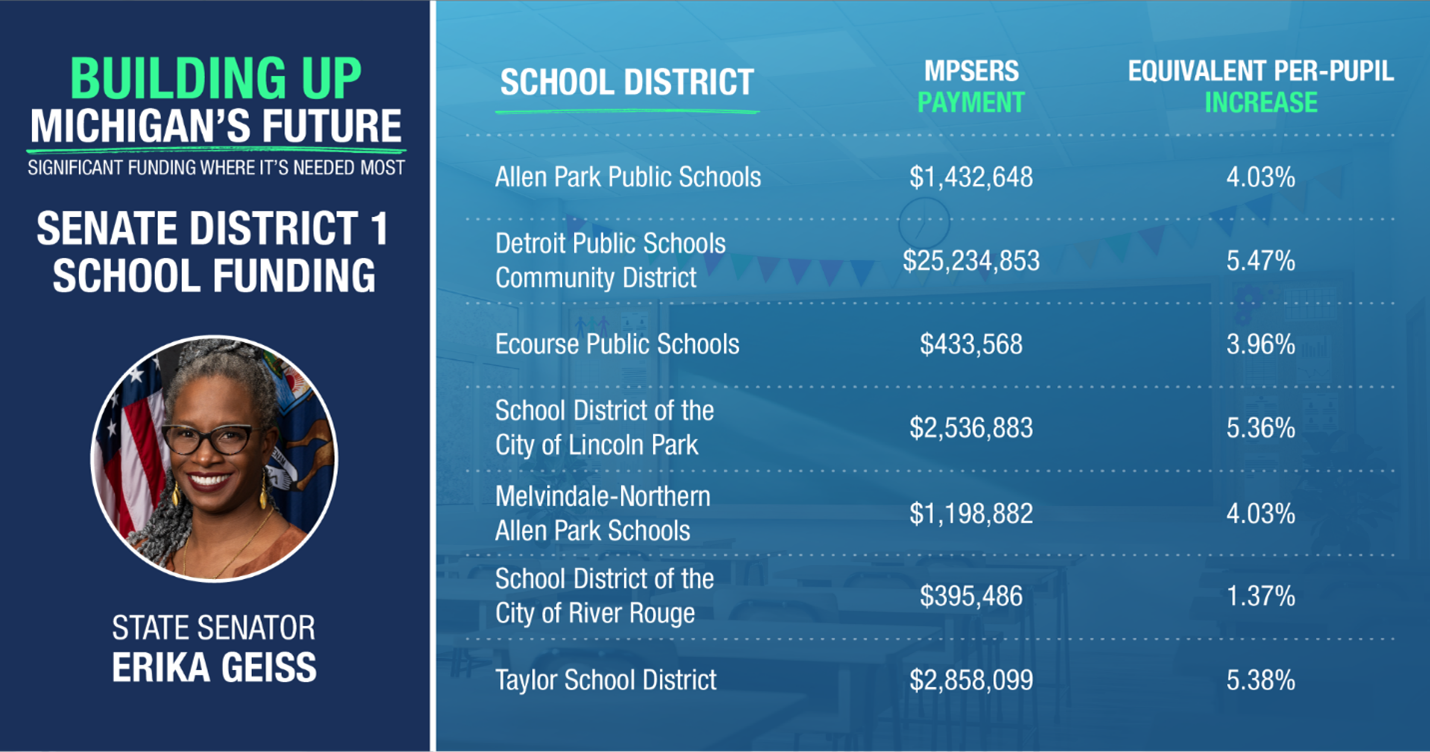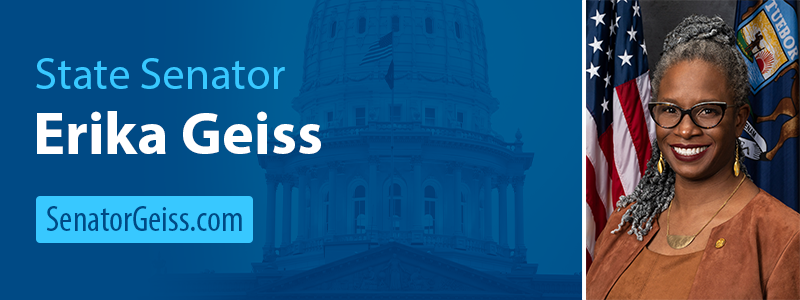Dear Neighbor,
This week marks the end of July and the beginning of August, so it’s time to get outdoors and enjoy the last few weeks of summer before the back-to-school season is in full swing!
Last week, Gov. Gretchen Whitmer put her stamp of approval on the Fiscal Year 2025 state budget, delivering historic investments to build up Michigan’s schools, families, workers, businesses, and so much more. Read on to learn more about the budget, along with updates about our progress in Lansing and District
If you or someone you know would like to provide feedback about what’s happening in Lansing or needs assistance, feel free to contact my office. You can contact me by sending an email to SenEGeiss@senate.michigan.gov or calling 517-373-7800.
Sincerely,

Erika Geiss
State Senator
District 1
In This Edition:
- In Recent News
- Honoring World Breastfeeding Week
- New Renewables Ready Communities Program Set to Launch
- Legislative Updates
- Signed into Law: State Budget Dedicated to Building Up Michigan
- Back-to-School Budget Signed
- 39 Bipartisan Bills Signed into Law
- Resources
- WIC (Women, Infants, & Children) Program Expands Eligibility Requirements to Serve More Families
- Find the Help You Need with Michigan 2-1-1
- Important Dates for the August Primary
- Free Summer Meals for Students
In Recent News
Honoring World Breastfeeding Week

In an effort to inform the public and engage action on breastfeeding advocacy, World Breastfeeding Week is recognized annually from August 1-7. This week and beyond, let’s continue working to promote inclusive environments that support breastfeeding parents, including adequate protections and resources to encourage one of the most effective methods of improving maternal and infant health.
Our caucus remains dedicated to ensuring every Michigan parent is well-supported in their breastfeeding journey, which is why Sen. Jeff Irwin introduced Senate Bill 351. This bill would expand Michigan’s Public Breastfeeding Nondiscrimination Act to ensure parents are protected from discrimination for pumping breastmilk in public, which is often necessary when parents are away from their breastfeeding baby for several hours. Senate Bill 351 successfully passed out of the Senate and now awaits further action in the House of Representatives.
New Renewables Ready Communities Program Set to Launch
Gov. Gretchen Whitmer recently announced the U.S. Environmental Protection Agency (EPA) has awarded the State of Michigan $129.1 million from the Biden-Harris administration’s Inflation Reduction Act’s (IRA) Climate Pollution Reduction Grant (CPRG) program to accelerate the deployment of renewable energy like wind, solar, and storage. The investment will help Michigan meet its 60% renewable energy and 100% clean energy standards set under the recently enacted clean energy laws. Getting this done will create good-paying jobs, drive down energy costs, and protect the state’s air, land, and water.
This funding will allow the state to launch Renewables Ready Communities (RRC). Administered by the Michigan Dept. of Environment, Great Lakes, and Energy (EGLE), the program will incentivize the permitting of renewable energy projects through local processes. The RRC Program will help overcome barriers to siting renewable energy and help the state reach its goal of 60% renewable energy by 2030. Deploying renewable energy at scale is critical to meeting the state’s climate and energy goals, and siting is arguably the most important barrier we face to build more solar, wind, and so much more across Michigan.
Interested communities and stakeholders can reach out to EGLE-OCE@Michigan.gov for more information. Check out EGLE’s website to learn more about the ongoing Renewables Ready Communities Award pilot.
Legislative Updates
Signed into Law: State Budget Dedicated to Building Up Michigan

Last year marked a significant milestone for Michigan Democrats as we capitalized on their first trifecta in 40 years to spearhead a transformative budget — directing vital resources into historically neglected sectors like infrastructure, education, and local communities.
Last week, Gov. Gretchen Whitmer officially signed the Fiscal Year 2025 state budget into law, building on last year’s transformative budget by continuing to invest in children and families, students and workers, public safety, community development, and more.
This Democratic majority views the state budget as both a values statement and a financial plan. Our cornerstones for the 2025 budget — transformational, innovative, equitable, and intentional — reflect the priorities established last year.
Read more here.
Back-to-School Budget Signed

Last Tuesday, Gov. Gretchen Whitmer put her stamp of approval on the K-12 budget for the 2024-25 school year. This budget continues putting Michigan students and educators first and foremost, helping to set our kids up for futures full of success and opportunity.
Last year, our Democratic majority began the popular free breakfast and lunch program for all Michigan public school students — and in this year’s budget, we continued this critical program to ensure that Michigan’s 1.4 million public school students are well-fed and able to focus on learning. More information about the free breakfast and lunch program can be found here.
Our education budget also implements the state’s first-ever “Opportunity Index” equity funding formula that strategically invests more dollars into districts based on their concentration of poverty, prioritizing students and schools with the highest level of need.
We also delivered on the promise of two years of free community college for high school graduates, helping improve access to higher education and better paying jobs. This ensures that every Michigan high school graduate, beginning this year, can obtain an associate degree or skilled certificate tuition-free, saving over 18,000 students up to $4,820 annually.
Michigan Senate Democrats remain committed to meeting the needs and interests of students, educators, and families in every corner of our state, and we look forward to another school year full of learning, growth, and opportunity for our kids.
Senate District 1 School Funding Specifics:

39 Bipartisan Bills Signed into Law
Just last week, Gov. Gretchen Whitmer approved 39 bills, delivering on a diverse range of bipartisan priorities. Here are a few notable bills sponsored by members of our Senate Democratic majority that were recently signed into state law:
- Senate Bill 175 (Sen. Sylvia Santana) to improve consumer protections by ensuring fairness and compliance in property tax assessments.
- Senate Bill 328 (Sen. Kevin Hertel) to improve public safety by updating standards for smoke alarms.
- Senate Bill 350 (Sen. Rosemary Bayer) to expand the Michigan Promise Zone Authority Act to provide more financial assistance for student educational needs in underserved communities.
- Senate Bill 398 (Sen. Sean McCann) to equip state agencies with the tools needed to enforce environmental regulations and promptly respond to emergencies.
- Senate Bill 482 (Sen. Kristen McDonald Rivet) to reduce waste, save time, and lower costs by modernizing Michigan’s requirements for the disposal of medical sharps containers.
- Senate Bill 571 (Sen. John Cherry) to require prevailing wage on certain renewable energy construction state projects, supporting Michigan workers and bolstering our economy.
- Senate Bill 599 (Sen. Erika Geiss) to allow eligible incarcerated parolees with a terminal illness to be released to an approved placement instead of a medical facility, allowing the Department of Corrections to focus its resources where they are most needed.
Resources
WIC (Women, Infants, & Children) Program Expands Eligibility Requirements to Serve More Families
Michigan’s WIC program has updated their guidelines to now allow even more families to qualify and receive benefits. Participants can use their WIC EBT card to purchase essential foods like fresh produce, milk, bread, eggs, and infant formula at select stores. Find out if you’re eligible and how to access benefits here.
Find the Help You Need with Michigan 2-1-1
Michigan 2-1-1 is an all-in-one resource for Michiganders. Call 2-1-1 or go to their website to find information and resources pertaining to utility assistance, housing programs, food assistance, HIV/STI services, COVID-19, home visiting, grief and bereavement resources and services and much more. The 2-1-1 line is open 24/7 and offers help in over 180 languages. You can also use this link to find your local number to text.
Help Protect Yourself and Save Money During National Vehicle Theft Prevention Month
Michigan Department of Insurance and Financial Services (DIFS) is encouraging vehicle owners to take steps to protect their vehicles from theft. According to the National Highway Traffic Safety Administration (NHTSA), more than one million vehicles were stolen in the United States last year — a 25% increase in vehicle theft totals over previous years.
Here are some precautionary safety measures you can take to help protect yourself from auto theft:
- Take preventative measures. Park vehicles in a locked garage if possible. If vehicles must be parked in a driveway, make sure they are locked and consider installing motion sensor security lights. While lights may not provide complete security, it may make some thieves think twice, making them leave the area and your vehicle untouched. Call local law enforcement and your insurer if your vehicle is stolen.
- Consider purchasing comprehensive coverage. “Comprehensive” is an optional coverage you can buy that will pay for your car if it is stolen or for repairs if it is hit by a falling object, collides with an animal, or is damaged in a fire, flood or by vandals.
Comprehensive insurance coverage also covers catalytic converter theft, which has risen in frequency across the country. Those who have not purchased comprehensive insurance coverage may end up paying out of pocket for repairs resulting from theft.
In addition to the safety measures to prevent vehicle theft, the following tips can help you to avoid catalytic converter theft:
- Install a catalytic converter anti-theft device. These are available from various manufacturers and can provide a level of security from theft.
- Etching the last 8 digits of the Vehicle Identification Number (VIN) into the metal of the converter can help deter thieves from stealing the part and make it harder for them to sell stolen converters to legitimate scrap yards and metal dealers. This can be done at many dealerships and body shops.
If you purchase comprehensive insurance coverage and have certain anti-theft devices such as a car alarm, you may qualify for discounts on your policy. Contact your insurance agent or company for more information.
For more information about vehicle theft prevention or to discuss auto insurance questions, call DIFS at 877-999-6442, Monday through Friday from 8:00 a.m. to 5:00 p.m. Consumers can also file a complaint against an insurance agent or company by visiting Michigan.gov/DIFScomplaints.
Important Dates for the August Primary
The Michigan State Primary is coming up next week on Tuesday, August 6, where Michiganders will determine which candidates will compete in the general election happening later this year. Voters will lend their support for candidates running for the U.S. Senate, U.S. House, Michigan House of Representatives, and other local offices. View the full list of candidates here and view your sample ballot here.
Below are important dates to be aware of for the Michigan State primary election.
- AV ballots available for voters June 27
- AV early processing locations
- Early in-person voting period July 27 – Aug. 4
- In-person voter registration required July 23 – Aug. 6
- A primary election will be held on Aug. 6
Find more resources and information about elections and voting in Michigan here.
Free Summer Meals for Students

It can be a challenge for families to keep food on the table while school is out for the summer. One in six kids in Michigan face food insecurity, and more than 850,000 Michigan children rely on free public school lunches. That’s why organizations and local school districts are working with Meet Up and Eat Up and providing those ages 18 and under with delicious, nutritious meals.
All summer long, children 18 and under can eat healthy, satisfying meals in their own communities at no cost. No application forms required, no registration needed, and no proof of residency asked for — just show up and enjoy a meal! All meals must be eaten at the site. Visit the interactive map for locations near you. You can also text “FOOD” or “COMIDA” to 304-304 to find free meals in your neighborhood.

